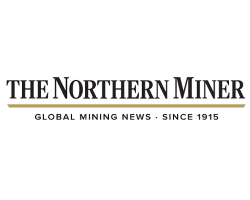The Cline Group's Donkin Coal Mine Enters Production in Nova Scotia, Canada

By Trish Saywell
June 1, 2017 - Underground coal mining in Cape Breton, Canada has resumed after a 15-year hiatus.
The Donkin mine started producing coal at the end of February and the underground operation should churn out 2.75 million saleable tonnes of coal a year over the next three to four years.
With a resource of 481 million tonnes–227 million tonnes in the indicated category and another 254 million tonnes in the inferred—the Donkin deposit has enough low ash, high-energy coking and thermal coal to last for 25 years or more.
Dawson Brisco, vice president of corporate development for Morien Resources (TSXV: MOX), which has a royalty on coal production from the mine, says much of the product will be sold to Asian markets, but some of it could find a home in Atlantic Canada for power generation.
“There are two power plants, one 30 km away and another 60 km away, so it’s conceivable that a portion of it will go as thermal to one of those two plants,” Brisco says, adding that “because it’s a swing product, it can go either metallurgical or thermal.”
No off-take agreement has been signed yet with Nova Scotia Power, Brisco adds, but in the middle of last year, a spokesman for the utility, Beverley Ware, “said they had ‘tested lab quantities and are looking forward to testing larger quantities as the mine production starts up,’ so I suspect that testing is likely happening now if not soon.”
The bottom line is that Donkin’s coal is good quality, he says. On the thermal side, it’s ultra-low ash, very high energy coal with BTUs that run up to 14,000. On the met side, it’s a high vitrinite, high fluidity, and high CSN (crucible swell number) product. “All these attributes make it a very sellable coal, either into the domestic market as thermal, or to the export market as a combination of thermal and met,” he says.
Kameron Collieries ULC, which is affiliated with the U.S. coal producer, Cline Group, purchased a 75% interest in Donkin from Glencore (LSE: GLEN) in December 2014. Glencore said it was selling its share in the project due to a change in its business strategy with a greater focus on larger volume mining complexes.
Morien sold its 25% working interest in Donkin to Kameron Collieries the same month for $5.5 million in cash in milestone payments and a scaled production royalty. The royalty is 2% on volumes less than 2 million tonnes and 4% on anything above 2 million tonnes and the company anticipates annual royalties of between $4 million and $8 million.
Kameron has already paid Morien the first two instalments of the $5.5 million in milestone payments, and Morien expects to receive the third and final payment within the next 12 months.
“We’re waiting for the royalty meter to turn on at Donkin so we expect to start receiving cash in the form of the final milestone payment but also in the form of royalty monies,” says Brisco, “and once that cash flow comes in it will top up our treasury and let us contemplate a dividend but also get more aggressive with project acquisitions as well.”
Brisco adds that he thinks the coal environment will continue to improve and that there is room for select development of high quality projects in the Atlantic Basin, due to steady demand from buyers in Europe and Asia.
Thermal coal is trading around US$75 per ton today. Two years ago, around the time Kameron took ownership of Donkin, thermal coal was trading at around US$45 ton, based on API-2 pricing, which is the index for European traded thermal coal coming out of the Atlantic Basin. (There are several thermal coal indices around the world providing quotes for coal based on origin, quality and destination.)
“I don’t have an outlook on thermal coal pricing but we probably won’t see the lows we saw two years ago, and I do expect Donkin’s cash costs will be in the lower quartile so it should be able to stay profitable in any coal pricing environment” Brisco says.
When Glencore did its feasibility study on Donkin in 2011, he notes, the company estimated Donkin’s operating costs would come in at less than US$60 per tonne.
“I suspect Kameron will produce coal for less than Glencore (Xstrata) predicted. Part of the reason Kameron purchased this project is because it’s so low cost and that fits with their profile in Illinois where Chris Cline the owner of Kameron has produced coal very profitably for around $20 to $30 a tonne for decades.”
Morien has $3.5 million in working capital and CEO John Budreski emphasizes that the company sees itself as very different from other juniors.
“We’re very unique,” he says. “Most junior mining companies are spending all their cash, issuing shares, and we’re buying back stock because we have surplus cash to our needs. We can see ourselves selectively adding assets.”
Morien has purchased 6.9 million of its own shares since the first quarter of 2015.
The company’s focus is on royalties in the industrial mineral, bulk commodity, specialty metal, and oil-gas sectors. While it is flexible and open to other opportunities, Budreski says, Morien is not willing to look in the precious metals space because it is too competitive.
The company is trading at around 55¢ per share within a 52-week range of 27¢ and 74¢ per share. It has about 53 million shares outstanding.

